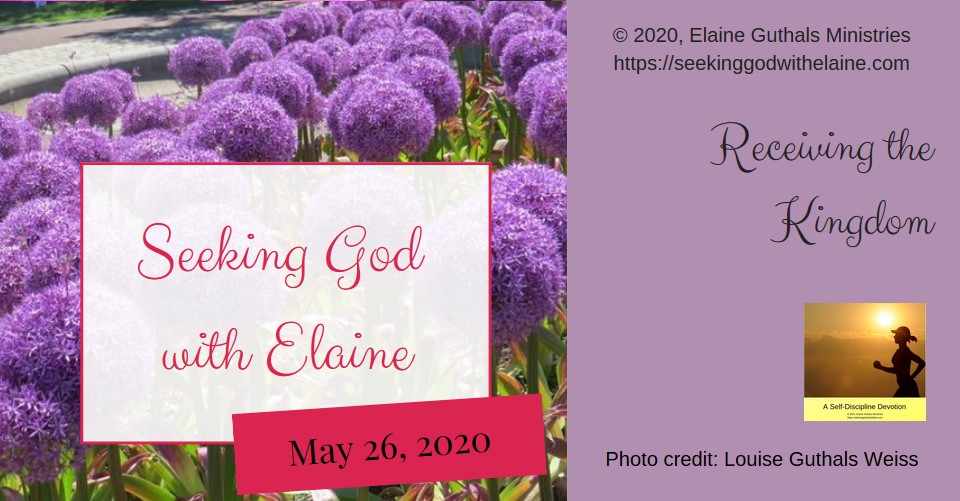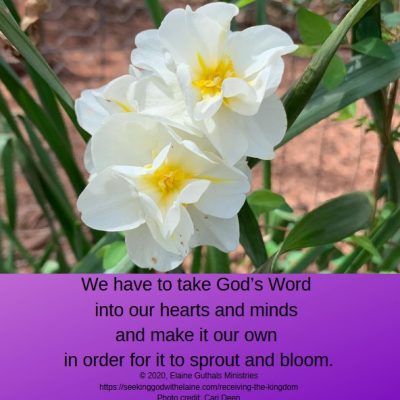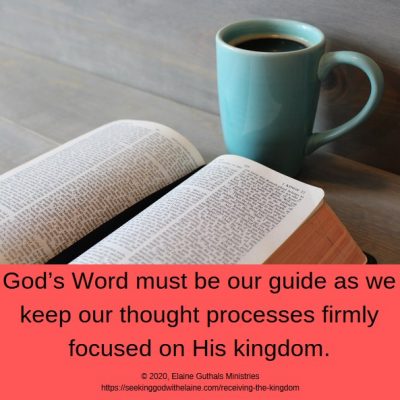Just hearing about the kingdom of God isn’t enough. We have to understand. Jesus told the parable about the sower to help us understand how we receive knowledge about the kingdom.
Nuggets
- We have to take God’s Word into our hearts and minds and make it our own in order for it to sprout and bloom.
- We can’t receive the Word as a feel-good band aid.
- God’s Word must be our guide as we keep our thought processes firmly focused on His kingdom.
- We have to be focused on His kingdom, and not the world around us.
Devotions in the What I Believe series
Devotions in the God‘s Kingdom category

I wasn’t sure about focusing on this passage. It doesn’t tell us about the kingdom of God.
But being a farm girl, I have always loved the parable of the sower. It tells us about ourselves and how we receive the Word of God.
Let's Put It into Context #1
According to the Holman Bible Dictionary, the kingdom of God is “God’s kingly rule or sovereignty.” It is interesting that then Old Testament does not talk about it, but the New Testament does.
Resource
Instead of it being a physical location, it is also spiritually the kingdom of God describes His sovereign reign. His rule over mankind was extended through the plan of salvation. By ABCDing, we submit our lives to Him.
The ABCDs of Salvation
If you have not become a believer in Christ, please read through the
Plan of Salvation and prayerfully consider what God is asking you to do.
A – admit our sins
B – believe His Son Jesus is our Redeemer
C – confess God as Sovereign Lord
D – demonstrate that commitment by making any changes needed in our lives to
live the way in which God has called us
The Disciple’s Job Description
Let's Put It into Context #2
“Then he told them many things in parables, saying, ‘Consider the sower who went out to sow. As he sowed, some seed fell along the path, and the birds came and devoured them. Other seed fell on rocky ground where it didn’t have much soil, and it grew up quickly since the soil wasn’t deep. But when the sun came up, it was scorched, and since it had no root, it withered away. Other seed fell among thorns, and the thorns came up and choked it. Still other seed fell on good ground and produced fruit: some a hundred, some sixty, and some thirty times what was sown. Let anyone who has ears listen’” (Mt. 13: 3-9 CSB)
The first recorded parable in the Book of Matthew that Jesus told is the parable of the sower. First, Jesus told the parable, and then He went back and explained it for the disciples.
Jesus ended the parable by saying, “Let anyone who has ears listen’” (Mt. 13: 9 CSB). Believers are called not only to hear and listen, but to also understand. It is hard to do that if there are distractions in our world and if we struggle with what is being told to us. We must choose to listen to God when He talks to us.
Scenario #1: Total Rejection
“When anyone hears the word about the kingdom and doesn’t understand it, the evil one comes and snatches away what was sown in his heart. This is the one sown along the path” (Mt. 13: 19 CSB)
The first scenario was when the birds came and snatched the seeds away (Mt. 13: 4). That was because the seed fell on ground that had not been prepared for planting.
Planting is a really good analogy here. We have to take God’s Word into our hearts and minds and make it our own in order for it to sprout and bloom.

But this doesn’t get that far. God’s Word is not even considered in this scenario. We would say that it goes in one ear and out the other.
Dods suggested several who may be a part of this scenario. One might be someone who is listening because it is something to do but not really hearing. Someone else, on the other hand, may possess a “… slowness and cold frostiness of nature …” that cannot be penetrated.
Scenario #2: Couldn’t Have Been
“And the one sown on rocky ground — this is one who hears the word and immediately receives it with joy. But he has no root and is short-lived. When distress or persecution comes because of the word, immediately he falls away” (Mt. 13: 20-21 CSB)
The second scenario in Matthew 13: 5-6 gives the Word a little more of a chance to take root — a little. It is actually received well. Jesus said the searcher receives it with joy.
It just doesn’t have anywhere to get traction. We can’t receive the Word as a feel-good band aid.
Instead, true searchers really seek God. Dods described it this way: “The man of deeper character receives it with seriousness, reverence, trembling, foreseeing the trials he will be subjected to.”
We’ve talked a couple of times that, when we learn something new, we have to have building blocks on which to tie that new content. Long time ago, I took a physical science class. It was an overview of chemistry, physics and astronomy.
I did okay on the astronomy because I had studied that before and I was interested in it.
The other two topics weren’t pretty. I had no frame of reference. The terminology was Greek to me. It was beyond my capabilities. The worst part was I really didn’t want to be there, but I had to in order to get my degree.
What this tells me is that — when we can — we shouldn’t just plant the seed. (Oh, yes. There will be times when that is the extent in our plans. And yes, they will have the Holy Spirit there to instruct them.)
We have to water the seed. We have to help pull weeds.
This is especially true for those that don’t have the building blocks for learning. Dods described that as “there is not depth of soil for any time to be spent in rooting.” We need to support those searchers.
Oh, yes. Being more than a planter requires us to really build a relationship with the searcher.
Maybe one good thing that can come out of this pandemic is our willingness to build true relationships. Before, many people seemed to just want to focus on the relationships within their inner circle. Any relationship outside the circle tended to be a surface relationship.
Hopefully, now we will be more open to building real relationships with others. Our witness will benefit.
Scenario #3: Could Have Been
“Now the one sown among the thorns — this is one who hears the word, but the worries of this age and the deceitfulness of wealth choke the word, and it becomes unfruitful” (Mt. 13: 22 CSB)
Okay, there is enough dirt to grow the thorns (Mt. 13: 7). But that is the problem. The thorns take up too much of the nutrients in the soil. The seed can’t grow.
Oh, my. I just had a really interesting image pop into my head. This is like us trying to get over to the cake and punch table at a reception. Only the room is really, really crowded. So, we have to use our shoulders to knock people out of the way just to take a step.
The thing is, people sometimes shove back when they get shoved. Worst case scenario is when it turns into a free-for-all.
If things were orderly, we could have our cake and be chowing down in two seconds. But it could take us minutes — or we may never get there — with enough obstacles in our way.
How many things of this life take our focus off the kingdom? How many obstacles does Satan put in our paths?
The sad part is that the searcher is genuinely searching for God. This life is too much of a focus, though.
Oh, I know. Some of the things we go through in life can be real doozies. We can’t shift focus to them from God. We have to keep our focus firmly on His kingdom.
God’s Word must be our guide as we keep our thought processes firmly focused on His kingdom. We have to be ready to fight back.

Dods made another interesting observation. He wrote, “Cutting down the thorns won’t do; still less holding them aside till the seed be sown. It is vain to hope for the only right harvest of a human life if your heart is sown with worldly ambitions, a greedy hasting to be rich, an undue love of comfort, a true earthliness of spirit. One seed only must be sown in you, and it will produce all needed diligence in business as well as all fervour of spirit.”
We’ve talked before about some people thinking they only need to be kind to others in order to get their ticket punched for heaven. Or doing the do’s and not doing the don’ts. Or just believing there is a God.
To read a related devotion, click the appropriate button below.
Most of that takes care of following God’s laws. But we are neither fully following them nor following them for the right reasons.
Plus, it does nothing toward regeneration. Regeneration is the change in us that God brings about when we go from being spiritually dead to spiritually alive. Only admitting our sins, believing Jesus is our Savior and Redeemer, and confessing God as our Sovereign Lord will bring about regeneration.
We have got to go from spiritually dead to spiritually alive to be allowed in the kingdom of God.
Scenario #4: Total Acceptance
“But the one sown on the good ground — this is one who hears and understands the word, who does produce fruit and yields: some a hundred, some sixty, some thirty times what was sown” (Mt. 13: 23 CSB).
We finally get to the good ground in Matthew 13: 9. Keach gave us the prerequisites for fertile soil:
“A perfect and sincere heart
“An obedient heart.
“A faithful heart.
“A jealous heart.
“A fruitful heart.”
We’ve got to be sincerely seeking God. We have to be focused on His kingdom, and not the world around us. We show that by following His laws and commandments.
Making the Connections
I love what Robertson had to say. He wrote, “In the soil of the heart is found all the nutriment of spiritual life, and all the nutriment of the weeds and poisons which destroy spiritual life. And it is this which makes Christian character, when complete, a thing so inestimably precious.”
It is all there. Yes, all the weeds and poisons are there. We have the free will within us to choose Satan.
But the free will is also in us to choose God. But it goes beyond that. The soil is fertile so the crops can grow the way they should.
I know. I have been struggling with this one temptation my entire life. I keep giving into it.
“In the soil of the heart is found all the nutriment of spiritual life …”
All of the nutrients are there. No, it isn’t impossible. We are not destined to be failures.
We are destined to be like Him.
Making the Connections to Self-Discipline
We have all at some point or another felt God was “way up there” and we are “way down here.” That may be a feeling common to those being introduced to God’s love.
We’ve been asking these questions all along so we can prepare for when we are asked to defend our beliefs. Here is the worksheet again. How would you describe God’s love when He is perfect and we are not?
- What does the Scriptures say?
- What do I believe?
- Why do I believe the same/differently than the Scriptures?
- What are the talking points when witnessing to a non-believer?
Related Links
I have created a worksheet of the questions above. Click on the button below to access it.
How Do We Apply This?
- We need to look at things from a God’s perspective. He sees us as He made us.
- We need to seek God faithfully.
- We have to focus on God and not this world.
- We need to improve our character to imitate Him.
Searching for and Seeking God
Hearing His Word (Rom. 10: 17).
Reading His Word (Rev. 1: 3).
Praying to Him (Heb. 4: 16).
Studying His Word (Ac. 17: 11).
Meditating on His Word (Ps. 1: 1-2).
Memorizing His Word (Ps. 119: 11).
Father. You see us in Your image. You see us as we are supposed to be and will be. Help us to see ourselves through Your eyes. Show us that the good sin is within all of us. Help us to grow closer to You. Amen.
What do you think?
Leave me a comment below (about this or anything else) or head over to my Facebook group for some interactive discussion.
If you don’t understand something and would like further clarification, please contact me.
If you have not signed up for the email daily or weekly providing the link to the devotions and the newsletter, do so below.
If God has used this devotion to speak with you, consider sharing it on social media.
Pingback: Conversations with a King – Seeking God with Elaine